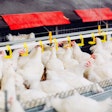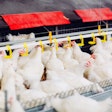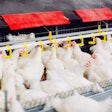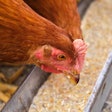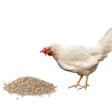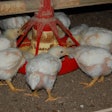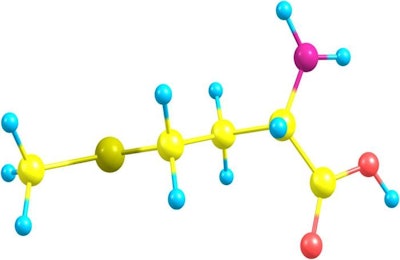
The animal agriculture industry is challenged with finding new, more sustainable ways to increase and optimize production, via the use of methionine, for example, in order to feed a projected 9 billion people around the world by 2050 while leaving less of a footprint on the Earth. Methionine, the largest amino acid added into animal diets, can be an effective solution for more sustainable animal production, with the supplemental benefits to producers of helping to keep costs down and improving animal performance.
The consumption of methionine has increased 6 percent over the last year, according to Jeff Klopfenstein, president, Methionine Business Unit, Novus International. Novus, the largest feed additives producer in the United States, began as a methionine producer in 1991, selling 92,000 metric tons of methionine in its first year. Now, Novus can produce 320,000 metric tons of methionine, said David Friedman, chief financial officer at Novus.
Klopfenstein and Friedman spoke on June 16 during a media event as part of Novus International’s 25th anniversary celebration, which took place at the company’s headquarters in St. Charles, Missouri.

Jeff Klopfenstein, president, Methionine Business Unit, Novus International, spoke on June 16 about Novus' plans for a new methionine plant to increase the global supply of this sustainable feed additive.
Benefits of methionine
Methionine can offer many rewards for livestock producers by increasing efficiency. Including the additive in feed requires fewer sources of more-costly and less-sustainable protein in the animal’s diet. With methionine in their feed, animals shed less nitrogen and ammonia and, so, emit less gas into the environment. It has also been proven to improve gut health and feed conversion, thereby reducing feed costs as less is required by the animal when digested more efficiently.
Increasing methionine supply
Yet, despite increasing demand for this amino acid, there has been no increase in methionine capacity in the U.S. in recent years. With a projected nearly 840,000 metric tons of methionine required globally over the next 15 years, Novus made the decision to invest in building a new, 120,000-metric-ton capacity methionine plant in the Gulf of Mexico serving both U.S. and overseas customers.
“Building on the U.S. gulf cost will claim the benefits of the shale gas revolution for low-cost energy and raw materials. Due to low-cost container and bulk parcel handle rates, it can serve Asia and Latin America and Europe and Africa economically from the same plant. We don’t know how self-sufficient Asia will be in meat production by 2025. What we do know is that our expansion plans work,” Klopfenstein said.
Although the exact site within the Gulf has not yet been announced, Klopfenstein said the company is accelerating the project and already has 80 employees in its office in Houston working on it. The new methionine plant is on track for startup in 2020.








